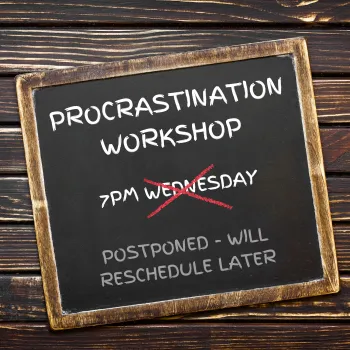
Say What? Procrastination Can Be A Good Thing?
Say What? Procrastination can be a good thing?
I was having a hard time getting started on this week’s newsletter. I couldn’t nail down my topic, then this question hit me. Am I procrastinating? Why am I procrastinating? My mother always said I was a procrastinator, but I never believed her. I always met deadlines, got my work done, but maybe not on the visible “start” schedule others had set for me, or even my flexible “mental” deadline. I decided to think about procrastination.
Most people view procrastination as a negative trait because it involves delaying or postponing tasks. This postponement may lead to reduced productivity or missed opportunities if the procrastination truly prohibits the necessary task at hand being accomplished when needed. But I believe there are situations in which procrastination might be perceived as a positive or beneficial behavior. Having a dominant domain of strategic thinking, (Think, create, learn) I can relate to several positive roles in which procrastination, in limited doses, can be beneficial. Here are a few scenarios where procrastination might have a silver lining:
Enhanced creativity: This is how I run. Not that I intend to delay a task, but when I initially can’t get off go, I find I will reach a point where I jump into my task, as a deadline looms. It leads to a burst of creativity when I finally begin working on it. It then flows unstoppably. The newsletter you are reading is a prime example! This is known as "productive procrastination." Taking a break from a problem or task can give your brain the chance to process information in the background, leading to fresh insights for the task. I think, create, learn.
Prioritization: If you're putting off a particular task for a long time, it might be an indication that it's not as crucial as you initially thought. This can allow you to focus on more significant and urgent matters.
Reducing stress: Sometimes, taking a brief break from a stressful task can help reduce anxiety and prevent burnout. By procrastinating on one task and engaging in a different, less demanding activity, you might recharge and approach the original task with a clearer mind. I am not sure I have looked at this process as reducing stress, but I find my procrastination in this as a limited circumstance does help me set a clear path on the task ahead. I just can’t keep adding additional tasks to the list to keep procrastinating more!
Time for reflection: Procrastination can provide time for self-reflection of your goals and priorities. You might need to make necessary adjustments to accomplish what you want long term.
If you remember, I started this dialogue with stating “procrastination in limited doses.” We can’t procrastinate indefinitely. We need to keep moving forward, particularly when there is a commitment or responsibility with completing the task involved.
Address root causes for your procrastination and develop strategies to overcome them. It may be as simple as redefining your clear objectives, breaking tasks into smaller, more manageable parts, creating a schedule, and finding ways to stay motivated and focused.
Of course, I employ essential oils for motivation and focus. (I wouldn’t be the Oil Diva if I didn’t!) Before I sat down to write this newsletter I applied Motivate and Blue Tansy. They did their job. 😎
Do you want to become part of a Wellness Revolution? Learn more about what I do at kimberleytyson.com and reach out. I would love for you to join me!
